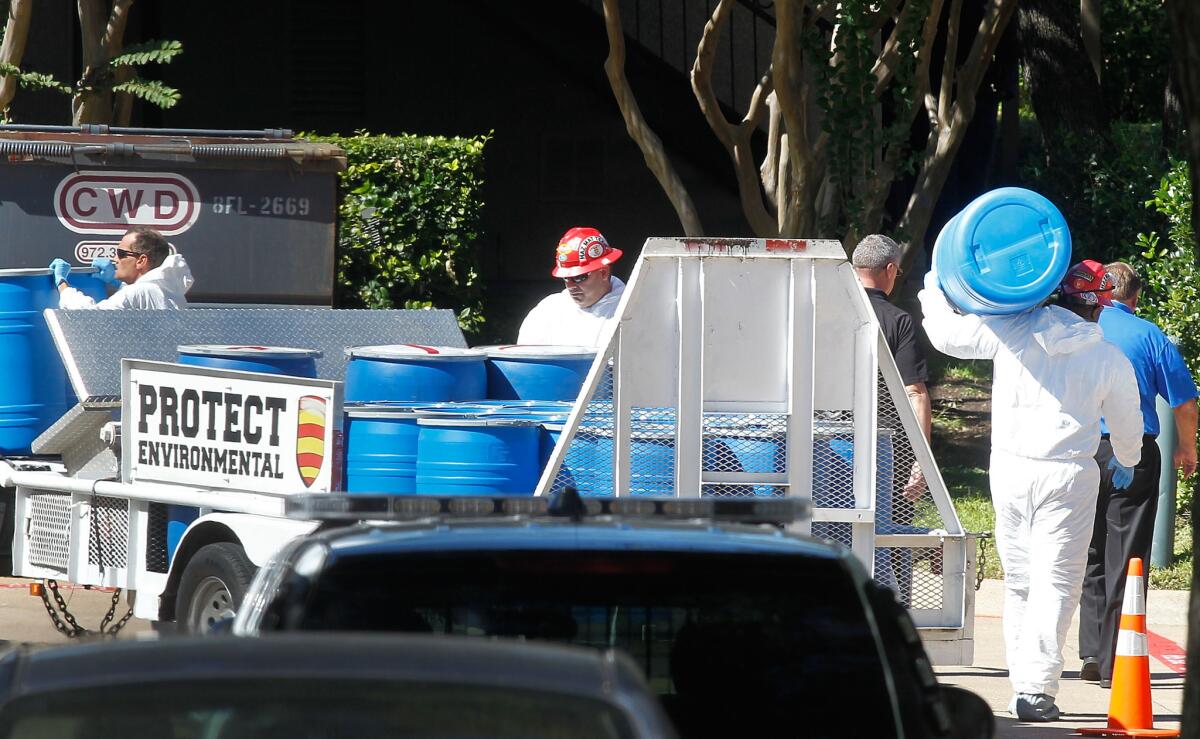As Ebola spreads, so does anxiety in Dallas

- Share via
Reporting from Dallas — Teresa Morales, 53, has been a nurse’s assistant at Texas Health Presbyterian Hospital or 16 years and has undergone surgeries there.
She does not work in the unit where the Ebola patients have been treated, does not know the nurses infected with the disease and is not among those being monitored because of contact with Thomas Eric Duncan, the first person to come down with the disease in the United States.
Yet, Morales said, she and her colleagues still face stigma.
“We have gone to restaurants and they don’t want to eat with us,” Morales said of people who learn she works at the hospital where Duncan died on Oct. 8 and which continues to treat an infected nurse, Nina Pham, 26.
“I’m more scared for my social life than I am of Ebola. I don’t even want to go out any more because I’m scared they’re going to blame me” for contracting Ebola, she said. Morales, still in her blue hospital scrubs, spoke Wednesday evening as she stood outside a town hall meeting for the public to ask questions and share concerns.
Morales, of Grand Prairie, said she wants to address people’s fears.
“That’s why I came, to see what people are thinking,” she said.
Dallas Mayor Mike Rawlings acknowledged that the mood in the city had changed since last week from calm to anxious. “I think this most recent situation — we’ve ramped this anxiety up. I think it’s natural,” he said.
Rawlings said the city had initiated a “facts, not fear” campaign to inform residents about the hospital outbreak.
The marquee at the theater where the town hall meeting was held read “;Ebola: facts not fear.”; As people entered, organizers passed out informational packets from Dallas County health and human services to the roughly 80 people who attended. A panel of public health experts answered their questions.
Ebola has a three-week incubation period and a fever is one of its early symptoms. The disease is spread only through direct contact with bodily fluids. Patients infected with Ebola experience sudden fever, intense weakness, muscle pain, headaches, vomiting and diarrhea. As the disease progresses, it can cause organ failure and internal bleeding.
During the town hall meeting, retired paramedic Richard Jackson, 60, asked what was being done to alert paramedics who might have to respond to those being monitored for signs of Ebola.
He said residents should be anxious.
“We do need to have a level of fear, but it needs to be an educated fear -- the right level of fear so that we can take precautions as a society,” he said. “We need to stop the spread.”
Follow @mollyhf for national news.
More to Read
Sign up for Essential California
The most important California stories and recommendations in your inbox every morning.
You may occasionally receive promotional content from the Los Angeles Times.














